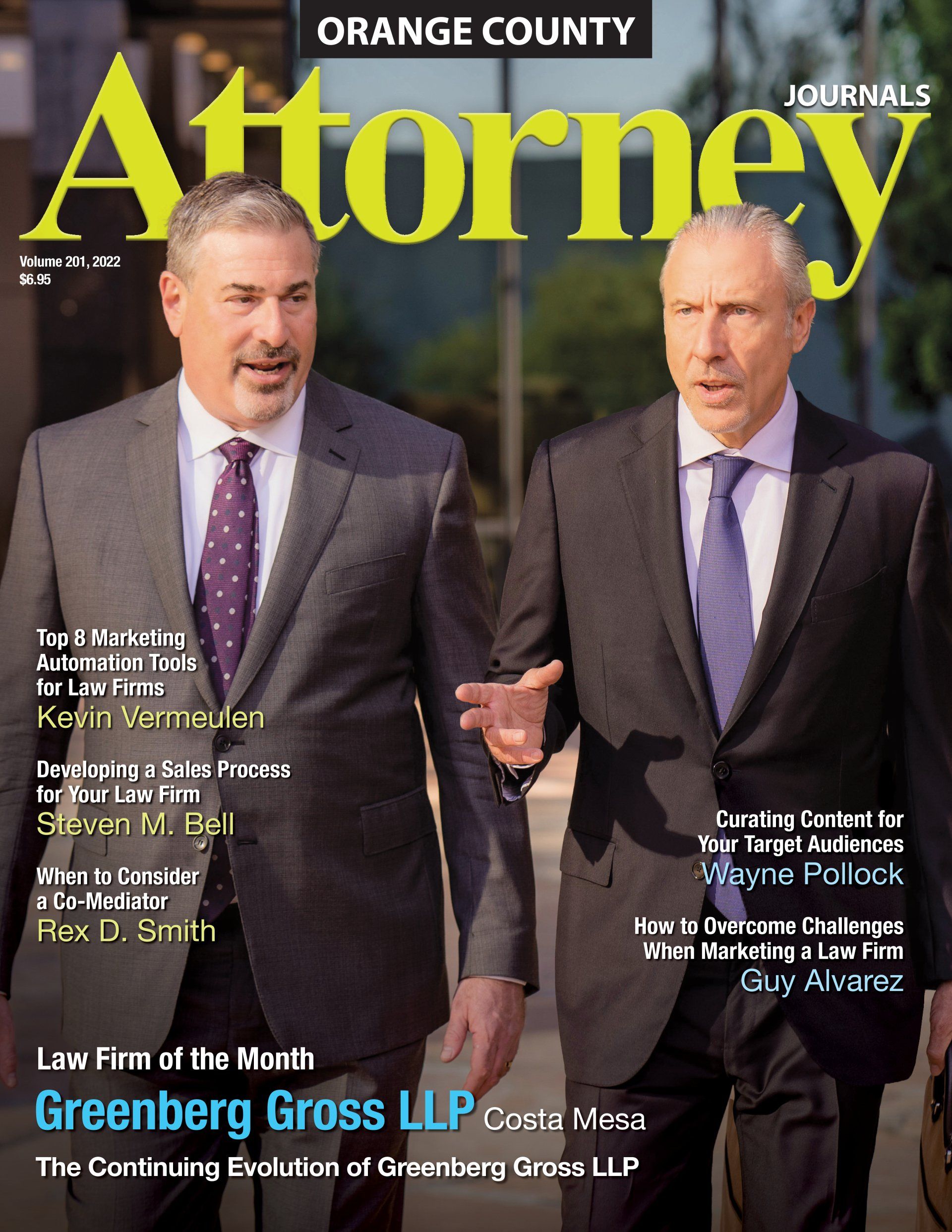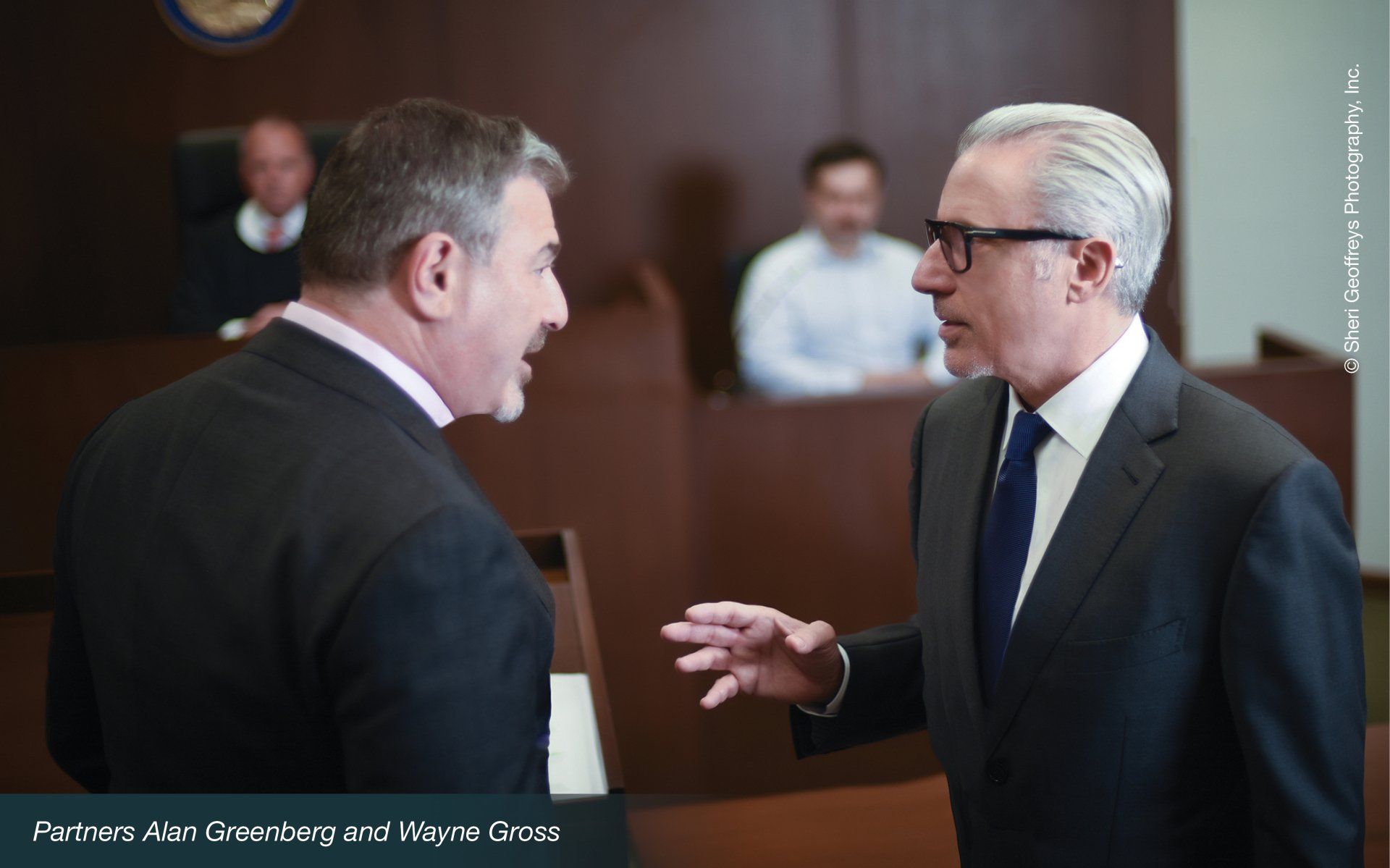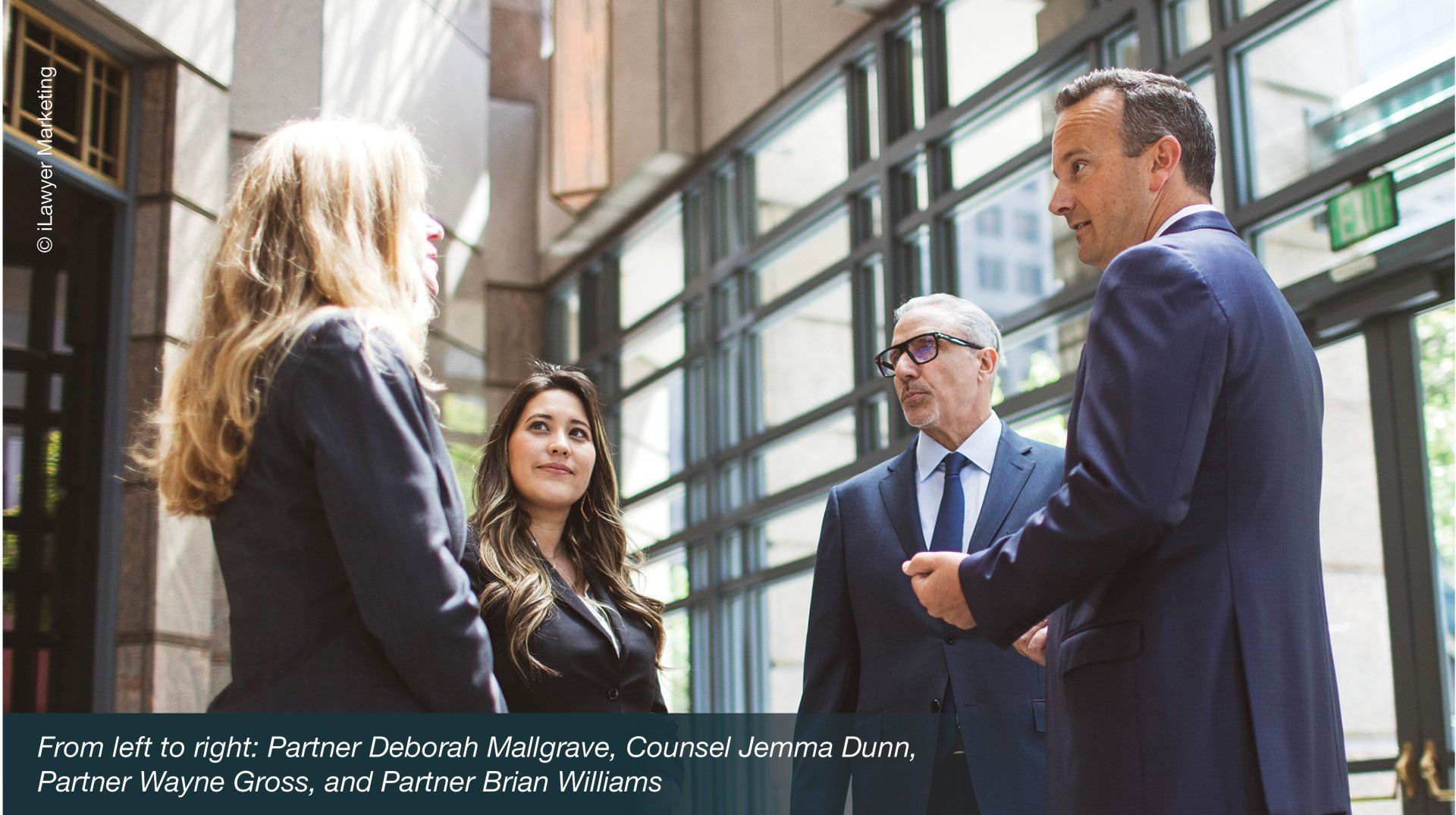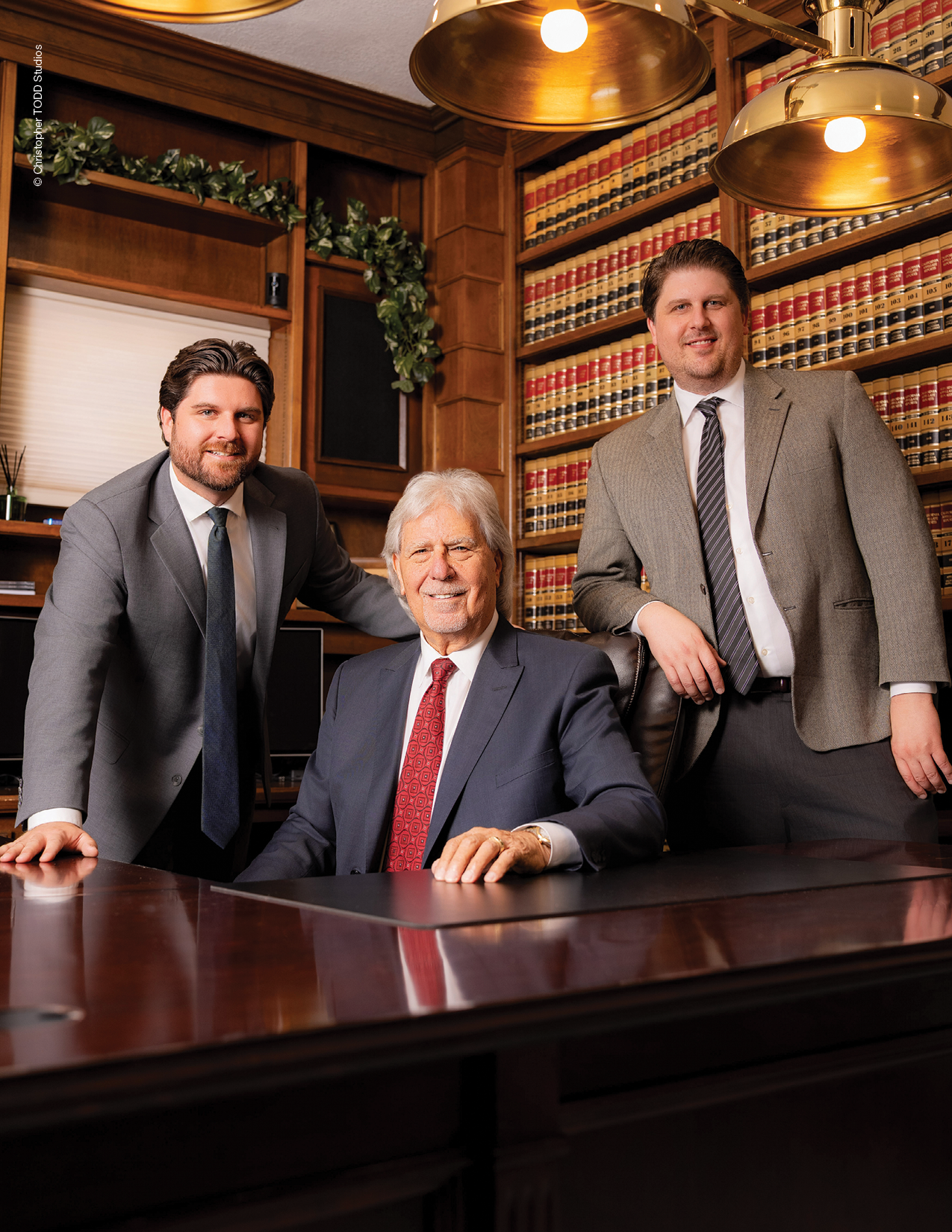The Continuing Evolution of Greenberg Gross LLP
Contact
Greenberg Gross LLP
650 Town Center Drive, Suite 1700
Costa Mesa, CA 92626
"We started this firm a decade ago to litigate complex business cases at the highest level. That mission remains but we have evolved to use our business litigation expertise to make a difference,” says Wayne Gross, Co-Founder of Greenberg Gross LLP. Alan Greenberg, Managing Partner, and Co-Founder, agrees. “We have grown organically based on opportunities to serve not only our expanding client base but also to make a positive impact on society.”
Founded in 2013, Greenberg Gross has focused on being the business litigation firm of choice for plaintiffs and defendants in bet-the-company trial work across the country. The firm started with one office based in Orange County. Today the firm has four offices: Costa Mesa, Los Angeles, Las Vegas, and New York, and a team of top lawyers who handle high-stakes matters for a roster of large companies, executives, celebrities, and law firms.
Consistent victories in the courtroom and over the negotiating table have made Greenberg Gross one of the elite business litigation boutiques in the country. The firm is routinely listed as one of the country’s “Best Law Firms” by U.S. News Media Group for commercial litigation. Greenberg describes the other side of the litigation “coin.” “What many people don’t focus on are all of our cases that settle before we ever step foot in the courtroom. Our reputation in the courtroom often makes opponents settle early to avoid losing at trial.”
A Rare Ability to Turn the Tables on Adversaries
Over the past decade, the firm has won numerous high-profile business trials, including a recent $70 million arbitration award on a counterclaim for a public company called Advantage Solutions that was defrauded by a company called Take 5. The facts of this case illustrate how adept the firm is at turning the tables on adversaries. Take 5 operated a business that conducted email advertising for customers, utilizing a proprietary database. Take 5 sold that business to Advantage for $77 million, plus a potential earn-out of up to $50 million depending on the performance of the business after the sale. After purchasing the business, Advantage discovered that a large part of Take 5’s business was fraudulent and that Take 5 had been scamming its customers. Upon discovering the fraud, Advantage notified law enforcement that it had unknowingly acquired a business that was engaged in systemic fraud. Advantage shut down the acquired business and offered refunds to the defrauded customers.
Take 5 commenced an arbitration against Advantage, claiming that Advantage had shut down the business to avoid paying the $50 million performance earn-out. Advantage retained Greenberg Gross, which filed a counterclaim on behalf of Advantage. In August 2022, after a 15-day evidentiary hearing, the arbitrator ruled in favor of Advantage. The arbitrator denied Take 5’s entire claim and awarded Advantage $70 million on its counterclaim.
“Our company was faced with not only having to litigate a complex, multi-year arbitration, but also with having to interface with federal authorities. Greenberg Gross represented us superbly with both.”—Bryce Robinson, General Counsel of Advantage Solutions
The victory for Advantage Solutions is by no means unusual for the firm. Indeed, the firm was founded as a result of Greenberg and Gross turning the tables on bad actors. In 2011, the two, while partners at a global law firm, co-tried a case on behalf of a Southern California real estate development company named Newport Capital Advisors (“NCA”) that had been defrauded by an East Coast investment fund. NCA, under the leadership of its principal, David Zak, had entered into a billion-dollar joint venture with the fund to redevelop aging Hollywood buildings and restore the area to its previous glory. The joint venture partners acquired four Hollywood properties, including the famed Hollywood Palladium, with the developer identifying and developing the properties and the investment fund providing the financial backing. After the properties gained $35 million in market value but before the development was completed, the investment fund sought to disavow the joint venture and shed itself of the developer, hoping to insert its own developer on the projects. Indeed, the investment fund, like Take 5 and its principals, filed the initial action, claiming in their case that the lack of a signed partnership agreement meant that the developer was effectively a service provider working for fees and not entitled to partnership rights. In response, Zak unleashed Greenberg and Gross who, instead of simply defending the lawsuit, filed a countersuit alleging that the investment fund, as a joint venture partner, had not only violated its fiduciary duties but did so fraudulently, entitling the developer to punitive damages. As Gross explained: “As a former federal prosecutor, I knew how to leverage an adversary’s bad conduct, and use it not just defensively as a shield, but affirmatively as a sword.” And use it they did. After a four-week trial in Los Angeles Superior Court, the jury awarded the developer $50 million, which included $34 million in punitive damages. Zak explained: “It’s not often that you get sued, go to trial, and come out $50 million ahead.” The developer was so appreciative that he told the duo that they should consider forming their own firm.
“I’ve been around a lot of really good lawyers over the years, but these two are a force of nature. It was their destiny to go out on their own and show the world what they could do.” -NCA Principal David Zak
The Backgrounds of the Founders Meshed Perfectly and Resulted in a Winning Formula
Following Zak’s suggestion, the duo started Greenberg Gross LLP in April 2013, and immediately took advantage of the freedom to do things their way. Greenberg explained: “It was liberating to be free of big-firm restrictions and to have the freedom to take on any case we felt was worthy of what we bring to the table.” They decided that they would continue focusing on complex business litigation for companies and executives that are sued but would also take on cases for companies and other clients that were wronged and were entitled to recover losses. And they would take on those cases for plaintiffs using contingent fees and other alternative fee arrangements. “We were finally able to tailor each engagement to what was in the best interests of each client,” said Gross.
The duo also decided that every lawyer at the firm would be trained from the beginning to be a trial lawyer, not just a litigator. As explained by Greenberg, “Some firms seek to do everything. We just wanted to be the best at what we do.” Interestingly, Greenberg started his legal career in New York as a transactional lawyer working on Wall Street financial transactions. While enjoying the intellectual challenge of the work, he decided early on that he was meant to be in the courtroom. “Everything happens for a reason. My Wall Street background enabled me to litigate complex business cases in ways many lawyers cannot.” From 1990 through 2007, he worked at high-end litigation boutiques in Orange County, before joining the international firm where he would meet Gross.
Gross, born as an orphan in San Francisco, grew up in a working-class neighborhood where he developed the grit that has stayed with him to this day. “The benefit of a tough neighborhood is that you develop toughness that can later be applied in numerous ways.” In Gross’s case, it meant that he would one day become a federal prosecutor. “The U.S. Attorney’s Office was a fantastic laboratory in which I learned not just how to try complex fraud cases against the most formidable opponents, but also how to put cases together before entering the courtroom.” According to Gross, “Many lawyers engage in pretrial discovery without the slightest idea of how they will use such evidence at trial. I learned the exact opposite approach.” Gross left government service for private practice in 2007, subsequently meeting Greenberg at the international firm where both felt an immediate kinship. “We came from backgrounds that were different but entirely complementary. We also shared a common vision on how complex business cases should be tried.”
And it was that chemistry that enabled the firm, over the ensuing decade, to win not only the $70 million Advantage Solutions case but numerous other high-stakes trials, including:
- In 2014, following a two-week jury trial, a multi-million-dollar verdict on behalf of the former chief operating officer of dialysis centers who sued the owner for failing to pay the COO his share of the $43 million sale of the centers. The jury found the defendant owner/seller liable for fraud and breach of contract. (KV Kumar v. Gadsalli Ravikumar, Orange County Superior Court Case No. 30-2013-00657199)
- In 2015, following a seven-week jury trial, a complete defense verdict and a multimillion-dollar verdict on a counterclaim, including punitive damages, on behalf of a global engineering firm that had acquired the assets of a local company only to discover that the company and its principals had engaged in wrongdoing. The principals, like the Take 5 principals, had sued the engineering firm for failing to pay an earnout. (Michael Colaco v. Cavotec SA, Orange County Superior Court Case No. 30-2012-00601735)
- In 2018, following an eight-week jury trial, a complete defense verdict for Buchalter, an AmLaw 200 law firm, in a $600 million RICO and fraud case brought by the heirs to the Alta-Dena Dairy fortune. The plaintiffs claimed that a close family friend conspired with a former law firm partner to gain control of the heirs’ estate and siphon off millions under the guise of implementing a highly complex estate plan. The jury rejected the claims, resulting in a complete victory after more than eight years of litigation. (Ruth McClamma Stueve, et al. v. Raymond Novell, et al., Orange County Superior Court Case No. 30-2010-00411651)
- In 2020, following a two-week jury trial, a jury verdict on behalf of an inventor against Uber Technologies, Inc., and its founders in the first phase of a $1-billion trade secrets theft case. The inventor began developing his concept as far back as 2002, creating a peer-to-peer service for passengers to summon drivers using cellphones, and to track the drivers using GPS, which he shared with the founders of Uber in 2006—four years before the launch of Uber—under a promise that they would keep it secret. He sued Uber and its founders in 2015, but the defendants claimed the suit was barred by the statute of limitations. After a two-week trial, the jury found that the inventor timely filed his suit. (Halpern et al., v. Uber Technologies, Inc., et al., San Francisco Superior Court Case No. CGC-15-545825)
The Secret of the Firm’s Success
The firm’s many trial victories, along with scores of favorable settlements, are no fluke. As explained by Greenberg: “The most important ingredient to our success is our team. We hire only the best and brightest, and then train and manage them in a way that maximizes their potential.” When hiring attorneys, the firm looks not only for top talent, but also for the willingness and drive to evolve with the firm and as an individual attorney. “We are very selective in our hiring. We want lawyers who have the desire and capability to provide world-class service,” Greenberg said. According to Gross: “Our clients, whether a large public company or an individual, typically come to us when they are facing an extremely significant crisis. They deserve our absolute best effort to get them through that crisis.”
firm believes that those lawyers who dedicate themselves in this manner are compensated in ways that go beyond the financial rewards of a successful legal practice. “We’ve seen junior lawyers join us right after law school or after a few years at a large firm and mature in ways that are amazing. It has been extremely gratifying to play a role in that transformation. Our intensive training program is a significant part of that growth,” Greenberg said.
Hiring the right attorneys is only the beginning. According to Greenberg: “When we started, Wayne and I were involved in every case, read every pleading, and made every major strategy decision. By doing so, we effectively trained our lawyers on a daily basis to work cases the way we do. We no longer do that because the firm is simply too big,” Greenberg says. The firm took dramatic action and created its own in-house training programs. The programs included constructing state-of-the-art courtrooms in its offices to maximize the learning experience. Before every trial, Greenberg and Gross, along with other senior partners, use the courtrooms to help prepare the lawyers who are going to trial.
In addition to using the courtrooms to teach trial advocacy, the firm uses them to train its lawyers on how to conduct pretrial discovery. “Every lawyer at the firm is trained from the beginning to be a trial lawyer, not just a litigator. Many business litigators at other firms approach pretrial discovery without focusing on how they will use the evidence at trial. Our lawyers begin envisioning how a case can best be presented from the first day they are assigned to a new case. They are taught to conduct all pretrial discovery, including depositions, interrogatories, and requests for production, with that single-minded focus,” Gross says.
The Buchalter trial proved the point. The firm had an associate conduct a cross-examination of a hostile witness called by the plaintiffs. Prior to the examination, the associate, using evidence obtained during pretrial discovery, conducted several practice cross-examinations in a Greenberg Gross courtroom. The practice sessions were used by Gross and the associate to refine both the questions and strategy. At trial, the associate’s cross examination was extremely effective and received high praise from the client.
Hire the Attorneys the Attorneys Hire
Perhaps there is no greater badge of excellence than being the firm called on when big law firms require aid in handling their own legal challenges. “If you want the best doctor for a particular specialty, find out whom other medical professionals turn to when they are in need of that specialty. There can be no higher endorsement,” Gross says.
One example of this was the Buchalter suit in which the firm was called upon to defend the AmLaw 200 firm in a multimillion-dollar lawsuit brought by the heirs to the Alta-Dena Dairy fortune. The heirs alleged that an estate planning attorney, who had worked at Buchalter between 2007 and 2010, engaged in various forms of misconduct relating to the dairy family’s estate plan. The parties conducted more than 100 days of depositions, exchanged hundreds of thousands of pages of documents, and collectively designated more than 20 expert witnesses. The case proceeded to trial in July 2018. The lawyer for the heirs told the jury in opening statement that Buchalter should be held responsible for damages in the range of $150 million or more. The case included a claim for violation of RICO that, if successful, would have resulted in treble damages and an award of attorney fees. Prior to closing arguments, the defense team won a directed verdict on the issue of punitive damages. After reviewing all of the evidence presented by both sides, the trial court concluded that Buchalter did exactly what employers are supposed to do when presented with a claim of misconduct against the estate planning attorney. The case went to the jury, which returned a complete defense verdict, rejecting all claims by the heirs and requiring them to reimburse Buchalter for various costs of defending the lawsuit.
“Greenberg Gross is strategic, tenacious, and in consummate command of the evidence and the law. They ensured that we were well represented every step of the way.” —Buchalter Executive Vice President, Pamela Webster
Business Litigation Expertise for Societal Good
At the beginning of 2020, an event occurred that caused Greenberg Gross to forever expand its complex business litigation practice to serve clients in other types of cases. As explained by Gross: “The firm had just won a landmark trade secrets trial against Uber. Alan and I were both in San Francisco for a post-verdict status conference and decided to visit the dean of UC College of the Law, San Francisco, which is within walking distance of San Francisco Superior Court.” While walking through San Francisco’s Tenderloin District, Greenberg and Gross were appalled by the neighborhood’s deterioration. Per Gross, “Homeless tent camps blocked sidewalks, open-air drug sales were in plain view and blight ruled.” The worst part for Gross, who was born in San Francisco, was that thousands of children, both housed and unhoused, lived there. “I was an orphan who, but for my fortunate adoption, could easily have found myself there. Something had to be done to give them a chance.” The firm offered its pro bono services to the law school and filed a groundbreaking federal lawsuit in May 2020 against the City and County of San Francisco. The lawsuit resulted in a Stipulated Injunction the following month, under which the City was required to offer safe housing to reduce the number of tents in the Tenderloin, and to enforce state and federal laws in the Tenderloin consistently with how they are enforced in more wealthy San Francisco neighborhoods. (Hastings College of the Law v. City and County of San Francisco, 4:20-cv-03033 (ND Cal.). As explained by Gross: “The change was fast. City officials are subject to powerful political forces that at times can cause paralysis. We wanted to see if involving the power of the federal court system could help and it did.”
The positive outcome in the Tenderloin suit led Greenberg and Gross to see how the firm could use its platform and business litigation expertise to serve other important societal causes. As explained by Greenberg: “We knew that our expertise in business litigation could be of service to clients in other types of cases involving societal issues.” The firm found its opportunity to do so in the California Child Victims Act (AB 218). In 2019, the California legislature passed the landmark legislation, which afforded survivors of childhood sexual assault an “open window,” during which they have until December 31, 2022, to file claims that would otherwise be barred by the statute of limitations. As a result, the firm, during the same time period of the Tenderloin lawsuit, opened a new practice area to represent survivors in sexual abuse and human trafficking litigation. According to Wayne Gross: “We knew we could assist survivors of childhood sexual assault in a manner that was not being done by the traditional small plaintiff shops that specialize in assault cases.” To educate the public on this landmark legislation and the cases that may now be filed as a result, GG created a new website: FightForSurvivors.com.
Since starting this new practice area, the firm has been retained by hundreds of survivors of childhood sexual assault and has already obtained multi-million settlements for numerous survivors. But the firm views these cases as providing far more than monetary recovery to survivors. As explained by partner Deborah Mallgrave, co-chair of the firm’s Sexual Assault and Human Trafficking practice group: “These cases often provide emotional closure to individuals who have been enduring internal torment since childhood. Additionally, we have found that the ravages of child sexual assault cut across all swaths of society and strike people from all walks of life.” One case filed by the firm is one of the largest and most significant cases ever brought under the Trafficking Victims Protection Act of 2000, against a global religious sect called La Luz del Mundo (“LDM”) for the alleged sexual abuse and financial exploitation of minors. (Martin v. La Luz Del Mundo, 2:20-cv-01437 (CD Cal.)). Gross and Mallgrave lead the team that is pursuing this RICO case against the church, which is built around a doctrine of subservience to its leader, the “Apostle,” who is alleged in the suit to sexually abuse children and adults, to exploit children for forced unpaid labor, and to engage in extortion and money laundering. After this groundbreaking suit was filed, the leader of the sect pled guilty to sexual assault felonies and is now serving time for those offenses.
Based on the positive impact of the Child Victims Act, the California legislature recently passed a similar law to address the injustice suffered by many survivors of adult sexual assault: The California Sexual Abuse and Cover Up Accountability Act (AB 2777). Starting January 1, 2023, survivors of adult sexual assault will have one year, until December 31, 2023, to file claims against perpetrators and entities that covered up their sexual assault. As explained by Brian Williams, the co-chair of the firm’s practice group: “For more than two years, our practice group, comprised of not only lawyers and paralegals, but also victim advocates, has developed the expertise to pursue cases for child sexual assaults that occurred decades ago, in a manner that has never been done. Cases often don’t get better with age because memories fade and evidence sometimes disappears. We know how to overcome those obstacles and look forward to applying that expertise to adult assault cases in the same powerful way.”
In addition to adding sexual assault matters to its robust business litigation practice, the firm, in 2020, was called upon to represent the PG&E Fire Victim Trust in litigation against vegetation management companies and consulting companies for their roles in devastating fires in Northern California in 2017 and 2018, which caused many fatalities and billions in property damage. As explained by Alan Greenberg: “There’s a tremendous amount at stake because of the tragic loss of life and the billions in damages. It is our mission to recover as much as possible for the victims so that they may have closure as they attempt to put their lives back together. Additionally, it is imperative that we send a powerful message to those companies who do business with public utilities to think twice before putting California residents and businesses in harm’s way.”
The Future of the Firm
Since its founding a decade ago, the firm has continued to evolve in ways that were not necessarily anticipated by the founders when they opened the firm’s doors. Greenberg summed it up as follows: “We expected that the firm would be successful. What we didn’t anticipate was that this would be such a remarkable journey in which we would be called upon to serve others in so many diverse ways.” Gross agreed by saying: “What we’ve learned is that business trial lawyers need not be confined to business disputes. The world needs us in more ways than that. We will continue to answer that call.”












